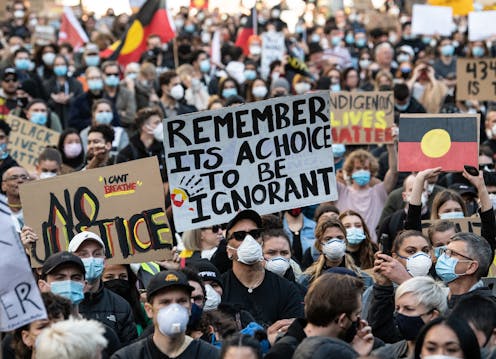Ten Twitter accounts you should be following if you want to listen to Indigenous Australians and learn
- Written by Bronwyn Carlson, Professor, Indigenous Studies, Macquarie University

Three in every four Australians hold a negative view about Aboriginal and Torres Strait Islander people, according to stark new research this week.
As ANU researcher Siddharth Shirodkar explained, these views can lead to widespread racism.
This study presents stark evidence of the solid invisible barrier that Indigenous people face in society. But the data is actually not about Indigenous Australians, it’s about the rest of us.
Yet while many Australians hold such negative views, many know very little about Aboriginal and Torres Strait Islander peoples, histories and cultures.
Don’t speak over us, or for us
For a long time, Aboriginal and Torres Strait Islander people have been calling for non-Indigenous people to listen to what we are saying and not speak over us, or for us. One great way to do that is via Twitter.
There are growing networks of Indigenous people online who are exerting significant influence on society here in Australia and worldwide.
This was made evident in the recent Black Lives Matter protests across Australia, where Indigenous people used social media to bypass traditional news organisations, demanding to be heard.
But more work must be done.
As activist Lynda-June Coe wrote this week
the energy and power of huge crowds marching the streets … must be maintained if we are to impact societal change through an attitudinal shift.
Support Indigenous people by retweeting, listening
Social media has the potential to amplify Indigenous voices and provide many sources of information for non-Indigenous people to learn more about Indigenous people, histories and cultures.
Part of this work is for non-Indigenous people to listen to Aboriginal and Torres Strait Islander people and support them by retweeting their posts and educating themselves on the issues.
Twitter in particular can be used as a forum for inquiry, curiosity, and political teaching and learning.
IndigenousX @IndigenousX
One example of this is IndigenousX, which provides a space to amplify diverse Indigenous voices. It was created in 2012 by Gamilaroi man, Luke Pearson, and features a rotating series of hosts.
Wakka Wakka woman, activist and student Bizzi Lavelle is the current host.
Below are nine other people and organisations worth following. Of course, there are many more you should follow than are listed in this article.
Read more: 12 deadly Indigenous Australian social media users to follow
Lynda-June Coe @LyndaJune1
Coe just finished a stint as an IndigenousX host. She is a Wiradjuri and Badu Island woman, PhD candidate, cultural educator and activist. She is one of the many young, powerful Aboriginal women activists demanding justice and rights for Aboriginal peoples.
Dr Debbie Bargallie @debbiebargallie
Griffith University senior research fellow Dr Debbie Bargallie is the 2019 recipient of the prestigious WEH Stanner Award. This is for the best academic thesis written by an Indigenous person.
Her research on racism in the Australian public service has just been published in a book. She is one of only a few Indigenous race scholars in Australia.
Nessa Turnbull-Roberts @TurnbullVanessa
Nessa is a Bundjalung writer and activist and winner of the Australian Human Rights Commission’s 2019 Young People’s Human Rights Medal. She is a law and social work student, who has dedicated her life to fighting against the injustices that disproportionately affect Indigenous peoples.
Hayden Moon @hayden_seek94
Hayden is a Wiradjuri Brotherboy and activist, who advocates for Indigenous LBGTQI+ peoples and those with disabilities. They promoted online access so people with disabilities could participate in last week’s rallies.
Aboriginal Health in Aboriginal Hands @NACCHOAustralia
The National Aboriginal Community Controlled Health Organisation is Australia’s peak body for Aboriginal health. They use social media to be in touch with Indigenous people across Australia and provide up-to-date health information and news of importance to us, including safe practices when joining protests marches during the COVID-19 pandemic.
Secretariat of National Aboriginal and Islander Child Care @SNAICC
The Secretariat of National Aboriginal and Islander Child Care (SNAICC) is the national peak body representing the interests of Aboriginal and Torres Strait Islander children and families. SNAICC is a non‐government, not for profit organisation, governed by a national executive of Aboriginal and Torres Strait Islander people, drawn from members in the early childhood education and family support sectors.
Celeste Liddle @Utopiana
Celeste is a Arrernte woman, feminist, union organiser and writer. She has a column in Eureka Street.
Celeste has contributed to a number of anthologies of note, including Growing Up Aboriginal in Australia and Mothers and Others.
Amy McQuire @amymcquire
Amy is a Darumbal and South Sea Islander woman from Rockhampton. She is a PhD candidate at Queensland University and journalist. She has 13 years experience in the Indigenous media sector and was a reporter for Buzzfeed. She has also written for The Saturday Paper, The Guardian and The New York Times.
Amy is also the co-host of an investigative podcast called Curtain – centred around the wrongful conviction of an Aboriginal man.
Dr Sandy O'Sullivan @sandyosullivan
Dr Sandy O'Sullivan is a Wiradjuri academic. They are an associate professor in creative industries at the University of Southern Queensland. Sandy’s research focus is on empowering and engaging national and international First Nations’ Communities. And includes queer studies, art and music.

